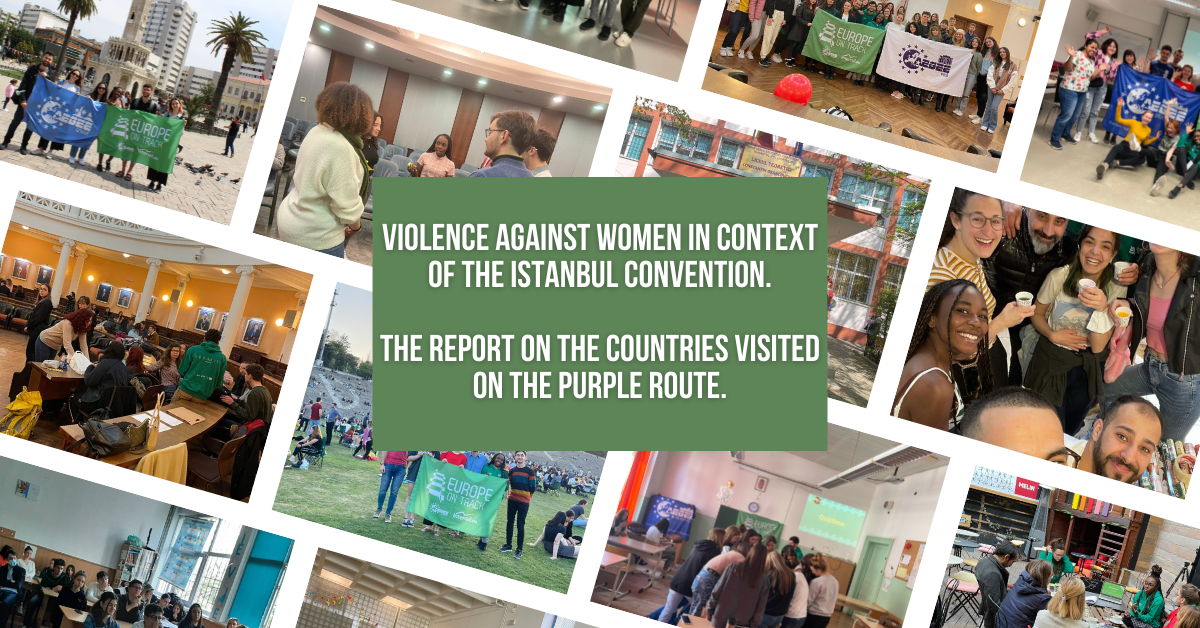During the Action Tour, the Purple Route has visited the following countries:
- Poland (Gliwice)
- Croatia (Zagreb)
- Hungary (Budapest)
- Romania (Bucharest)
- Bulgaria (Sofia)
- Serbia (Niš)
- Turkey (Ankara, Izmir, Istanbul)
Below, you can find the reports of our ambassadors on the current situation of these countries with regard to the implementation of the Istanbul convention, gender inequality issues and the view of GREVIO on it.
TURKEY
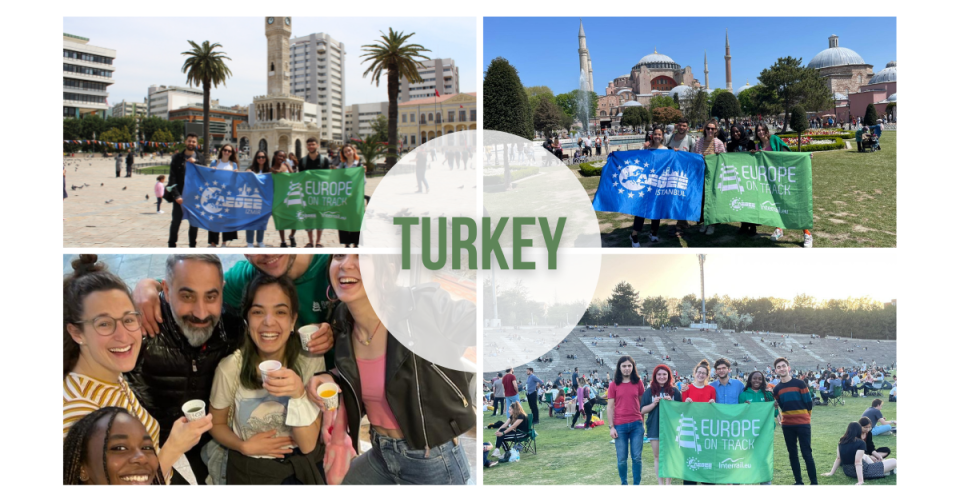
THE ISTANBUL CONVENTION’S DIRECT CONNECTION WITH TURKEY
The Council of Europe Convention on preventing and combating violence against women and domestic violence owes a lot to Istanbul, Turkey’s iconic city. It’s here that the Council of Europe’s Committee of Ministers approved the Convention in 2011, and it’s also where, one year later, the document was ratified for the first time, by Erdoğan’s government. Entering into force in 2014, this legal instrument commits countries to respond to gender-based violence, introducing a series of new crimes and establishing new forms of protection for victims of abuse and discrimination.
WOMEN IN TURKEY
- 2 out of 5 women have been affected by gender-based violence
- Femicides in the last 10 years have tripled
- On average, 5 women are killed weekly
- 61% of women have been victims of gender-based physical violence
- Turkey is 133rd out of 156 countries judging by gender equality
THE FACTS OF THE ISTANBUL CONVENTION IN TURKEY
- Turkey was the first country to sign (2011) and ratify it (2012)
- Also, the first to withdraw from it (2021)
- The withdrawal sparked a lot of protests and criticism worldwide
- But also increased the number of women who are subject to Gender-based violence in turkey
DID THE ISTANBUL CONVENTION HELP?
The internationally binding treaty wasn’t enough to prevent honour killings or domestic violence in Turkey, but most women and charities believe it was essential in a country where misogynist views have become and continue to become more vocal.
PRESIDENT ERDOGAN’S WORDS:
Women are protected by Turkish values and traditions. The Istanbul Convention intended to promote women’s rights and got hijacked by a group of people who are attempting to normalize homosexuality.
In 2020, there were approximately 300 femicides in the country, but the number could be at least 50 per cent higher because there were a further 171 cases of women dying in suspicious circumstances. Many deaths are wrongly reported as suicides, such as the case of a 23- year-old woman who was sexually assaulted by her boss at work and then thrown out of the window to make it look like a voluntary act. According to a 2019 investigation, over 40 per cent of Turkish women have been victims of at least one form of abuse throughout their life.
TURKISH GOVERNMENT’S CLAIMS THE ISTANBUL CONVENTION:
- Promotes Homosexuality
- Encourages divorce
- Threatens the traditional “sacred” family
Over the past year, the pandemic may have given a further push in this direction. Women’s support helplines recorded a spike in phone calls reporting violence. But, overall, and seemingly paradoxically, the rate of femicides has doubled since Turkey ratified the Istanbul Convention, showing that the instrument alone is not sufficient to change the picture.
Rather than reinforcing it with other national measures, Erdoğan’s government chose instead to rid itself of the Convention completely, paving the way for a further descent into the abyss for women’s rights. In a country where almost nothing is protecting women from violence, the Istanbul Convention was the last safety net for Turkish women.
So long story short, if major changes won’t happen in the Turkish government’s views and treatment of women first, the Istanbul Convention can’t do much to change the situation. The Convention’s inefficacy is therefore not due to any inherent weakness, but rather to the simple fact that Turkey has steadfastly ignored its provisions over the last decade. “The Istanbul Convention improves women’s condition from all perspectives in Turkey. It’s a lifesaver and, rather than talking about its withdrawal, we should be discussing how to implement its provisions in an effective way,” Çakmak continues.
“Rather than safeguarding women, the decision to deprive us of such an important instrument inevitably encourages men to continue being violent, in a country where femicide is already one of the biggest problems”
– Ege Çakmak, We Will Stop Femicide
Faced with such a critical situation, feminist movements and human rights organisations have never stopped making their voices heard. After the withdrawal from the Convention was announced last March, thousands of people poured into the streets to protest, and the police responded with violence. Similar scenes have been witnessed in recent months in relation to news stories that deeply affected the Turkish public, such as the case of Pinar Gültekin, a 27-year-old university student who was strangled, set on fire, and then hidden in a concrete-covered bin by her former partner.
POLAND

According to the European Institute for Gender Equality:
With 55.8 out of 100 points, Poland ranks 24th in the EU on the Gender Equality Index. Poland’s score is 12.1 points below the EU’s score.
Since 2010, its score has increased by only 0.3 points, with a slightly higher increase (+ 0.6 points) since 2017. Poland’s ranking has dropped by nine places since 2010.
According to the European Institute for Gender Equality:
Poland is in the group of countries with the lowest rates of physical and/or sexual violence experienced by the women from their current or ex-partner and with regard to psychological violence experienced on the part of the partner.
European Union Agency for Fundamental Rights survey data results showed that:
- 19% of women in Poland have experienced physical and/or sexual violence and only 28% reported the most serious incident to the police;
• 9% of women in Poland have been stalked;
• 32% of women in Poland have experienced sexual harassment.
What is being done to eliminate violence against women in Poland?
Poland has no violence against women law but does criminalise numerous forms of violence.
Poland passed a law in 2005 (amended in 2010) that provided a definition of domestic violence, although domestic violence is not a specific criminal offence in Poland.
Acts of domestic violence are punishable under various offences, such as mistreating another person mentally and physically
Implementation of Istanbul Convention
Poland signed the Council of Europe Convention on preventing and combating violence against women and domestic violence (Istanbul Convention) on 18 December 2012 and ratified it on 27 April 2015.
The right-wing Polish government had announced its intention to withdraw from the treaty last summer, claiming it did not respect religion and promoted controversial ideologies about gender.
In its first report on Poland, the Council of Europe’s GREVIO:
Praises recently introduced emergency barring orders, it lauds growing case law based on the specific criminal offence of stalking, the introduction of innovative criminal offences that capture the offline and online manifestations of harassment and stalking.
Despite such progress, greater steps to stop sexual violence, rape and sexual harassment must be taken, according to GREVIO, starting with changing the definition of rape itself. As with some other previously monitored countries, Poland should align the definition of rape with convention requirements, which move away from a force-based definition to one covering all non-consensual sexual acts.
GREVIO praises recently introduced emergency barring orders, growing case law based on the specific criminal offence of stalking, and the introduction of innovative criminal offences of harassment and stalking.
Despite such progress, greater steps to stop sexual violence, rape and sexual harassment must be taken, according to GREVIO, starting with changing the definition of rape itself (from a force-based definition to one covering all non-consensual sexual acts).
Research on gender-based violence and implementation of Istanbul Convention in Poland.
In a report released on September 16, the Council of Europe condemned Poland for not adequately preventing or countering violence against women and girls. The report was drawn up by the Group of Experts on Action against Violence Against Women and Domestic Violence, which monitors the implementation of the Istanbul Convention on preventing and combating violence against women.
“This report confirms what Polish women and girls know all too well: that the deeply misogynistic attitude of their government puts them, with each passing day, more and more at risk of suffering violence,” said Monica Costa Riba, campaigner by Amnesty International on women’s rights in Europe.
“The lack of adequate protection for the victims of violence, a culture that tends to blame them for the violence suffered, outdated laws and impunity constitute a dramatic mixture. Instead of addressing this urgent problem, for example by adopting a consensus-based definition of rape crime, Polish lawmakers are threatening to make the country even less safe for women and girls, such as through the proposal to withdraw from the Convention. Istanbul in favour of a new law on ‘family rights’ that would limit gender equality and the rights of LGBTI people ”, continued Costa Riba.
The report by the Council of Europe urges Poland to reform the section of the criminal code concerning sexual offences “by incorporating the notion of freely given consent and ensuring adequate sanctions for all sexual acts committed without the consent of the victim”.
The report also highlights the difficulties of Polish women in terminating pregnancies following a rape, although rape itself is required by law as a reason for resorting to abortion. Women face all sorts of obstacles when they have to obtain an investigation report certifying the suspicion that pregnancy is the consequence of a criminal act and when they seek information and references on medical services that carry out legal abortions. These procedures should also be introduced and applied when doctors refuse to perform abortions for reasons of conscience.
In its first report on Poland, GREVIO, the Council of Europe’s Group of Independent Experts in charge of monitoring the implementation of the Convention on preventing and combating violence against women and domestic violence (Istanbul Convention), expresses satisfaction with the recent institution of urgent measures that allow the police to temporarily remove the perpetrator of domestic violence from the family home. These measures, accompanied by training initiatives, reflect the positive efforts made by the Polish government to implement a “fundamental element” of the Convention.
The report, published alongside government comments, and based on in-depth research and the results of a visit to the country late last year, also welcomes growing case law related to the specific crime of stalking, introduced in 2011, as well as the introduction of new offences related to offline and online sexual and moral harassment, and online identity usurpation, including the possibility of increasing the sentence when such acts have led the victim to suicide.
However, GREVIO believes that, despite such progress, further measures must be taken to put an end to episodes of sexual violence, rape and sexual harassment, starting with the modification of the definition of rape. Like a number of other countries that have already been monitored by GREVIO, Poland should align the definition of rape with the provisions of the Convention, i.e. moving from a definition based on evidence of use of force to a definition that covers all. non-consensual sexual acts. GREVIO stresses that, if criminal law does not provide a definition of rape based on the absence of consent, prosecutors will “invariably decide” not to request the indictment of the suspect in cases where the proof of the act is not contested. sexual, but the consent of the victim. Of the 17 countries previously subject to an evaluation report, three have introduced the crime of sexual violence based entirely on the absence of consent: Belgium, Malta and Sweden.
In Poland, the Istanbul Convention was defined by Zbigniew Ziobro, Minister of Justice, “a feminist invention that aims to justify homosexual ideology” when he asked for its withdrawal by announcing that he wanted to stipulate a new international treaty on “family rights ”With Bulgaria, Hungary, Croatia, the Czech Republic, Slovakia and Slovenia. This was in July 2020 and in those days the same bell rang in Turkey. And now, on the same days which the president of Turkey has issued the provision on the withdrawal from the Convention, in Poland the parliament has discussed a bill entitled “yes to family, no to gender”. They seem more than coincidences.
The bill Yes to the family no to gender, which originated from the ultra-Catholic womb of Ordo Iuris and landed in parliament on March 30 after being signed by the 150,000 necessary signatures, has as its main objective the detachment of Poland from the Istanbul Convention, ratified in 2015. The draft proposes an alternative convention on “family rights”, identifying the causes of domestic violence in the weakening of family ties and traditional social values, marking the prohibition of abortion through the periphrase of “protection of life from conception ”And the concept of marriage as reserved exclusively for the union between man and woman. As Magdalena Chrzczonowicz reports on Oko.press, the key point is precisely the concept of “gender”, which the Istanbul Convention identifies as the historical construction on which the patriarchal scaffolding rests and which, for the promoters of the law, would be in contradiction radical with the foundations of the Polish Constitution. The outcome of the discussion in the Sejm (the lower house of the Polish parliament) which took place on March 30 was the referral of the bill to a parliamentary commission.
On the same day, a report by the human rights organizations IPPF-EN, Human Rights Watch and CIVICUS was released, denouncing the threats of bombs and death that arrived between March 15 and 26 to 7 groups that support the law. abortion in Poland. At least 6 human rights organizations received emails with bomb threats on 8 March. Federa, the organization for reproductive rights, interviewed by ilfattoquotidiano.it, received bomb threats via e-mail on 12 and 23 March. The threats were reported to the police, which according to the testimonies collected in the report did not open in-depth investigations. “Instead of fueling anger against those who seek to defend fundamental rights, Polish officials should focus on doing everything in their power to protect women and women’s rights, including the rights of peaceful assembly and freedom of expression. , to access safe and legal abortion and to be protected from violence, ”said Aarti Narsee, a researcher in civic space at CIVICUS.
The manipulation of data provided by supranational organizations to quantify the incidence of gender-based violence and acts of discrimination against LGBTQ + subjects also forms part of the strategy aimed at undermining the Istanbul Convention, conducted by Ordo Iuris and other organizations. The goal is to demonstrate that Poland is one of the countries that are doing better in terms of respect for women and the rights of LGBTQ + people, for example by waving the fact that the incidence of domestic violence is higher in Sweden than in Poland. Without considering that, as happens for the data aggregated by WHO (World Health Organization), OECD (Organization for Economic Cooperation and Development) are provided by the States themselves in a non-homogeneous way and that the greater sensitivity and awareness of the problem also favour emergence, as is the case in Sweden for example (criticality highlighted by bodies that use independently collected data, such as the European Union Agency for Fundamental Rights. One of the examples of this attempt is found here (Stopgenderconvention. org) and here (Ordoiuris).
HUNGARY

According to the European Institute for Gender Equality:
With 53.0 out of 100 points, Hungary ranks 27th in the EU on the Gender Equality Index. Hungary’s score is 14.9 points below the EU’s score. Since 2010, its score has increased by only 0.6 points, with a slightly higher increase of 1.1 points since 2017. The country’s ranking has dropped by three places since 2010.
Domestic and gender-based violence
A few numbers (according to the EU Agency of Fundamental Rights survey):
- 9% of women in Hungary (18–74 years old) have been victims of physical and/or sexual violence in the 12 months before the survey interviews were conducted.
- 28% of women in Hungary experienced physical and/or sexual violence by a current or previous partner, or by any other person since the age of 15.
- 27% of women have experienced physical or sexual violence by an adult before the age of 15.
- 49% of women have experienced psychological violence (controlling behaviour, economic violence, abusive behaviour, blackmail whit/abuse of children, any psychological abuse) in their relationships.
Prevalence Data on Different Forms of Violence against Women
- Lifetime Physical and/or Sexual Intimate Partner Violence: 21%
- Physical/Sexual Intimate Partner Violence in the last 12 months: 6%
- Lifetime Non-Partner Sexual Violence: 3%
According to NANE (Women For Women Together Against Violence Association)…
NANE Association’s research reveals shocking data about the number of women suffering from regular psychological, physical, or sexual abuse at home – more than 223,000.
There are only 2-3,000 temporary, preventive distancing processes in progress. The excessively low number of these cases was even lower in the past five years. In 2014, it was 1,792, and last year, only 1050 – this 60% relapse shows that only a small number of these cases reach the police.
In 2020 the Hungarian Parliament has refused to ratify the Istanbul Convention
The country signed the treaty in 2014, but in 2020 the Hungarian Parliament has refused to ratify the Istanbul Convention – the first legally binding international instrument for preventing and combating violence against women and domestic violence. The parliament maintained that Hungarian law already ensured that women were legally protected.
Moreover, according to the majority, the Istanbul Convention could promote ‘illegal migration’ (it calls for protection to be guaranteed to victims of gender violence) and ‘gender ideology’, which is considered to be ideologically contrary to Hungarian law and the beliefs of the government
What is Hungary doing against gender-based violence?
Currently, some nongovernmental organizations and governmental organizations work to combat violence against women.
The Women for Women Together Against Violence Association (NANE, in Hungarian) combats violence against women and children focusing on individual assistance, which is provided primarily over the phone by staff and volunteers. The NANE helpline receives about 2,000 calls each year about abuse-related issues.
These aims have been carried out through the following measures in Hungary in the last ten years
- Since 2005 Crisis Intervention Centres —- to help people seeking refuge because of domestic violence
- Since 2006 a state-funded Victim Support Service — provide financial, legal, psychological and practical support
- Since 2006 the Charity Sorsunk es Jovonk (Our Fate and Future) is operating a shelter for abused persons.
- In 2008 the Ministry of Social Affairs and Labour launched a reintegration model project for victims escaping from domestic violence.
- There were changes of great importance in relevant legislation —- issuing a protection order during the criminal proceedings
Unfortunately, we must note that Hungarian society does not strongly condemn violence against women and this situation ends up influencing the related criminal proceeding.
It must be considered that there are no precise statistics on how to quantify the actual victims.
The reason is to be found in the low propensity of Hungarian women to report cases of violence of which they are victims.
Research on gender-based violence and implementation of Istanbul Convention in Hungary.
The Hungarian Parliament has not ratified the Istanbul Convention, the most advanced text and the first legally binding international instrument for preventing and combating violence against women and domestic violence adopted by the Council of Europe in 2011 and signed by Hungary in 2014. The country’s two majority parties, Prime Minister Viktor Orbán’s conservative and populist party Fidesz and the Christian Democratic People’s Party (KDNP), motivated the decision by citing the “illegal migration” that the text would favour and the so-called ” gender ideology “.
In the declaration voted by the majority of the Hungarian parliament, in addition to rejecting ratification, the government is asked to put pressure on the European Union to do the same. It is said that all legal safeguards to protect women from domestic violence are already present in the laws of the country and that the Convention contains an unacceptable approach to “gender”. The so-called “gender ideology”, the object of criticism from the Pope, Catholic associations and conservative and far-right movements around the world, completely incorrectly claims that “gender” denies the biological difference between men and women.
(What gender ideology is and what it is not)
For Fidesz and the Christian Democratic People’s Party, the rules of the Istanbul Convention on asylum and reception – which basically ask for protection to be guaranteed to those who have suffered gender-based violence – are not consistent with the country’s policies on migration: they would favour and that is, they would simplify “clandestine” immigration.
After the vote against the Convention, a group of opposition parliamentarians protested, accusing the prime minister of waging a war against women. Amnesty International Hungary director David Vig said in turn that “even before the pandemic, the government had been unable to prevent and combat violence against women, with a shamefully low number of investigations and trials.”
Last April, after assuming full powers citing the epidemic as the reason, the government of Viktor Orbán approved a ban on the rectification of personal data even in the event of surgical sex reassignment. Since 2010 Orbán has introduced laws restricting press freedom, built walls to prevent the passage of migrants, and promoted uncompromising positions against Muslims, homosexuals and women.
CROATIA

Date of signature
On 22 January 2013, the Republic of Croatia signed the Council of Europe Convention on Preventing
and Combating Violence against Women and Domestic Violence
Date of ratification
Ratified it on 13 April 2018 by adopting the Act ratifying the Council of Europe Convention on Preventing and Combating Violence against Women and Domestic Violence; the Convention)
Entering into Force
It entered into force in respect of the Republic of Croatia on 1 October 2018.
Gender-based Violence Domestic violence in Croatia persists to be a dominant form of gender-based violence. Statistics show that out of the total number of women who have been killed in Croatia during the past five years, in 50% of the cases perpetrators were their partners. Prevention of Gender-based Violence Croatia received and accepted 25 recommendations relating to the theme of gender-based violence; ensuring effective law enforcement for the prevention and punishment of domestic violence against women and reducing the gap between legislation and practice. Amendments of the Croatian Criminal Code once again introduced the criminal offence of domestic violence. Two years later, the Croatian Parliament adopted a new law, the Act on Protection against Domestic Violence. In 2019, there were 9,626 reported cases of domestic violence in Croatia which is 6.3% less than in 2018. Since the beginning of the COVID-19 epidemic in 2020, the number of criminal offences of domestic violence in Croatia has increased by 43.4% compared to the same period in 2019. Since the start of the COVID-19 pandemic, domestic violence has increased by 75%. Signed in 2013 “Gender refers to socially-designed roles, behaviours, activities, and traits that a particular society considers appropriate for women and men”
Opposition to the Convention
The most visible opposers have been a number of Catholic bishops and priests who have encouraged their parishioners to oppose the ratification, as well as the conservative NGO U Ime Obitelji (In the Name of the Family) and the citizens’ initiative Istina o Istanbulskoj (Truth about Istanbul’s [Convention]).
MAIN OBJECTIONS RAISED
The introduction of a so-called “gender ideology” in the Croatian legal system perceived a loss of state sovereignty Support of the Convention.
Twelve well-established Croatian NGOs that work on feminist issues, LGBT rights and human rights, organised a protest which gathered a couple of thousand people in Zagreb’s “Cvjetni” square on the cold and snowy morning of Saturday 10 February 2018.
This protest, dubbed the Handmaid’s March because it included about a dozen women dressed as handmaids from Margaret Atwood’s dystopian novel marching through Zagreb’s city centre, demanded the prompt ratification of the Convention by the Croatian Government and Parliament. On Thursday 22 March, the Croatian Government adopted a draft law on the ratification of the Istanbul Convention along with an interpretative statement and sent it to parliament. The interpretative statement was introduced in order to mitigate anxieties and tensions regarding the Convention’s so-called ‘gender ideology’ agenda. It states that the Convention is compatible with the Constitution of the Republic of Croatia, that its aim is to protect women from all forms of violence and that its provisions do not contain the obligation to introduce a gender ideology in the Croatian legal and educational system.
Results
Ratification meant that the Convention was incorporated into Croatia’s legislation. The Convention includes many valid mechanisms to assess the situation of domestic abuse and violence against women in Croatia. It also proposes concrete steps to better the position of women such as:
Providing financial assistance to victims of domestic abuse Providing crisis centres for support and counselling Obligates Croatia to provide annual funding for an adequate number of shelters for women Obligates Croatia to provide legal assistance to victims Croatia is also currently working to provide victims with 24-hour phone lines, medical and forensic expert teams, and greater police powers in dealing with perpetrators of violence.
BULGARIA
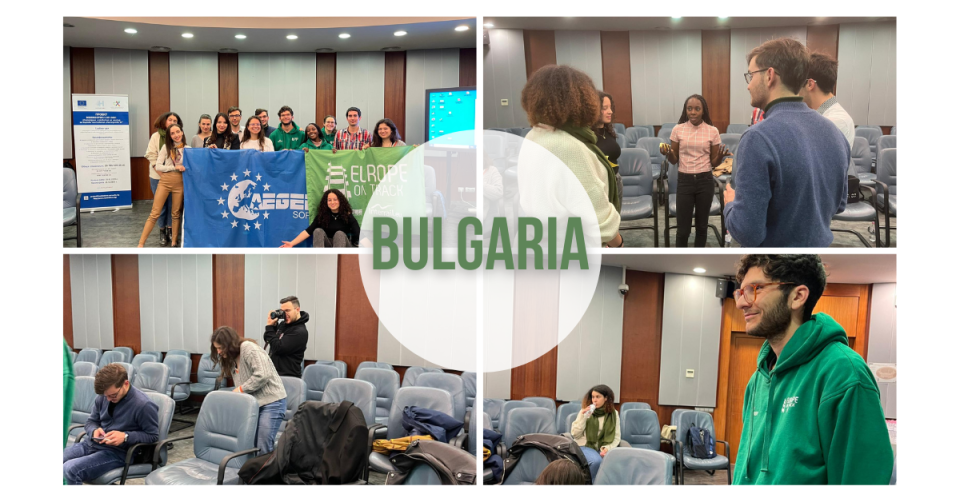
Date of signature
On the 21st of April 2016, Bulgaria signed the Council of Europe Convention on Preventing and Combating Violence against Women and Domestic Violence
Date of ratification
Bulgaria has yet to ratify the Istanbul Convention
Entering into Force
The Convention came into force in Bulgaria in May 2014
Controversy
In February 2018, Bulgaria’s Prime Minister, leader of Party GERB which governs in coalition with three far-right Parties, withdrew a motion for ratification from Bulgaria’s Parliament. The decision to not ratify the Convention is because it repeatedly threatened that the hidden motive behind the Istanbul Convention was imposing “the third sex” on Bulgaria’s society and legalising gay marriage March 2020 request from the Supreme Court to the Constitutional Court to define the term gender/sex in the context of Bulgaria’s constitution Controversy arose around the treaty’s use of the term “gender” as a social construct as opposed to the biological “sex”. First, this is not a decision taken in unanimity – four judges dissented. Second, the majority was particularly troubled that the notion of “gender” enshrined in the Istanbul Convention could not be reconciled with the Bulgarian “binary understanding of the sexes”. They referred to Article 47(2) of Bulgaria’s Constitution, which obliges Bulgaria to provide paid maternity leave and free obstetric care, concluding that the female biological sex was related to the following social roles according to the constitution – being a mother, giving birth and obstetric care.
SERBIA
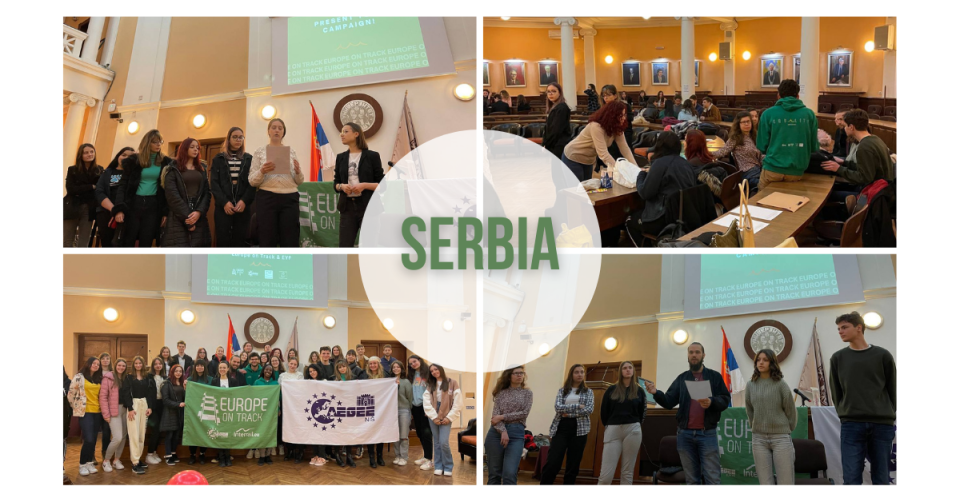
The adopted Constitution of Serbia from 2006 endorses equality for women and men, mandates equal opportunities policies and prohibits direct and indirect discrimination, including discrimination based on sex, gender identity, sexual orientation, marital and family status
Serbia signed the Convention on the 4th of April 2012
It got ratified on the 21st of November 2013
Entry into force is dated the 1st of August 2014 (one of the first countries)
The Republic of Serbia published its 3rd Gender Equality Index in 2021
23rd place, just before Croatia and after Bulgaria registers comparatively higher progress (58.0 in 2021 compared to 55.8 in 2016) progress is inconsistent across domains
Continuous progress: domains of labour and of power
If progress continues at this pace, there will be full equality in the domain of power within 2.5 years.
Inconsistent trends: domains of money and knowledge
Stagnant trends: domains of time and health biggest achievement: ‘The normative basis for gender equality and the formulation of new gender equality policies is established in the recently adopted Law on Gender Equality and amendments to the Law on the Prohibition of Discrimination.’Serbia improved by criminalising all kinds of domestic violence and implemented new laws, but especially psychological violence needs more recognition since in practice psychological harm is rarely prosecuted within criminal proceedings
But GREVIO is still asking f.e. to recognize ‘all types of relationships, including all former partners, married or not, and irrespective of whether the perpetrator shares or has shared the same residence with the victim or whether they have a child together and to train medical staff regarding that ‘psychological harm inflicted in the context of domestic violence is equal to physical harm and to increase training on how it may be evidenced and prosecuted’
it differs from judge to judge if a single incident is sufficient or serious enough for a perpetrator to be judged
Some achievements to be recognized, the process continues slowly, awareness is rising, but still, a lot to do.
ROMANIA
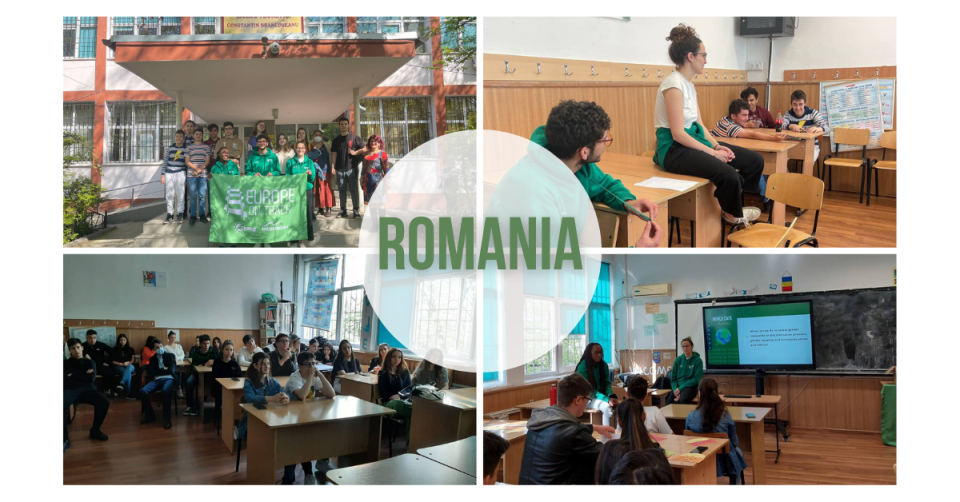
- the policy on equal opportunity and equal treatment between women and men was first legislated in 2002
- the main government body for equal opportunities was established as a national agency in 2005
- Romania signed the Convention on the 27th of June 2014
- It got ratified on the 23rd of May 2016
- Entry into force is dated the 1st of September 2016
Gender inequalities are most pronounced in the do¬main of power (34.7 points). Romania’s ranking has dropped from 18th to 21st place in this domain since 2018. The country is furthest away from gender equality in economic decision-making, ranking 26th with only 19 points.
- the domain of power (34.7 points): Romania’s ranking has dropped from the 18th to the 21st place, it is furthest away from gender equality in economic decision-making, ranking 26th with only 19 points
- Romania’s ranking in the domain of work (22nd) is among the highest for the country, but there are significant gender inequalities in the sub-domain of gender segregation and quality of work, in which Romania scores 5.2 points below the EU’s score
- With 69.1 points, Romania’s score has improved the most in the domain of money – by 6.1 points since 2018. However, Romania ranks 25th in this domain among all Member States
Some great achievements:
- Romania fulfilled its promise of creating a professional cadre of gender equality experts, with 1,100 people and 4,000 technicians trained as experts in equal opportunities
- Increase in labour market participation
- Improvements in political decision making
But also:
- The gender gap in employment is wide
- The gender gap in unpaid care work is growing
